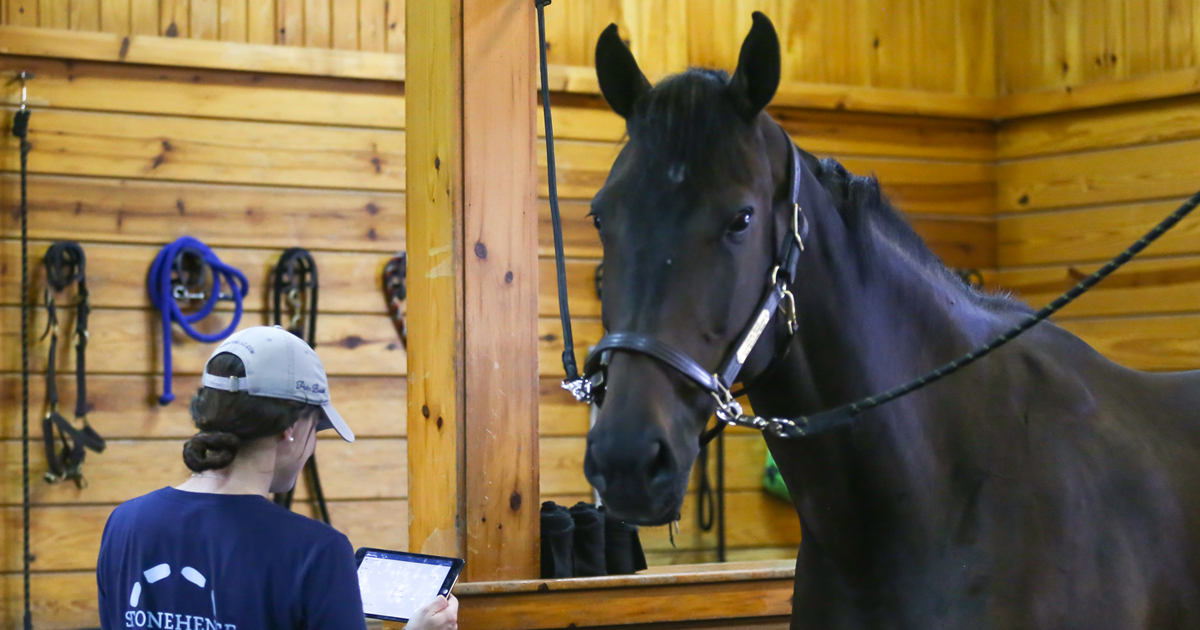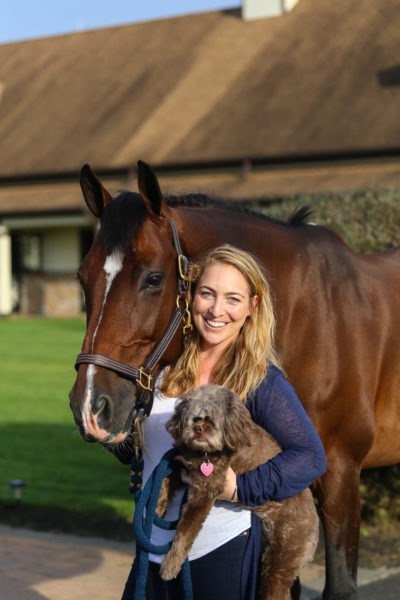New Technology Races Equine Industry into the Future

The business of horses is an old one—rooted in tradition, and also logistically very complex. For hundreds of years, the equine industry has relied on moribund record-keeping systems often involving pen-and-paper files kept in a barn. As a result, communication wasn’t always smooth.
“For barns that go to competitions, you’re moving a large animal from one place to another. But, you’re also moving grooms, vets, farriers, managers, equipment,” Nicole Lakin MBA’17 says. “On top of that, there are different levels of equine activities, and each of those is fairly insular. There are horses for kids who want to learn some basic skills and there are horses that compete in the Olympics and on an international circuit with several levels in between. It makes for a unique challenge.”
To meet this challenge, two Babson alumni—Lakin and Nick Bourdon ’20—are hoping to give the $102 billion equine market a nudge with their businesses.
After graduating in 2017, Lakin launched BarnManager, a web-based horse care and barn management software for horse owners to track their animals’ work schedules, maintain health records, create monthly invoices, manage their barn’s calendar, and generally improve communication between stakeholders.
Four years later, Bourdon founded Artemis Horse Match, an email platform that helps equestrians find sale horses. Through its proprietary horse-matching algorithm, equestrians submit criteria into an enormous database that produces email horse matches. “Normally, finding a ‘sale horse’ can take about six months,” Bourdon says. “With Artemis, I can do that in five minutes.” The software also continues to provide matches at a current maximum rate of 50,000 emails a day.
Admittedly, software in the old world of horses can be met with skepticism. But, Lakin and Bourdon have grown to know and support each other, recognizing that each has a common goal, that of trying to help modernize the equine industry.
Meeting Through Babson
Lakin and Bourdon came to the industry in different ways. Lakin grew up riding and is a self-described “barn rat.” Bourdon grew up in Boca Raton, Florida, near one of the country’s premier equestrian centers, which gave him a deep appreciation of the animal. “I was introduced to the industry five years ago through my friends in polo, hunters, and jumpers. I taught myself the industry alongside colleagues and figured it out,” he says. “Then, I worked toward solving one of the industry’s bottlenecks of finding a horse accurately and efficiently.”

Lakin and Bourdon were at Babson at different times and in different programs, but in 2020 they connected through The Arthur M. Blank Center for Entrepreneurship. The equine industry is “somewhat insular,” Lakin says, “so there’s a chance we never would have connected if it weren’t for Babson.”
Soon enough, the pair realized that with their complementary strengths they could help support one another in their efforts to innovate and begin to transform the equine industry. The duo collaborate on business and product development. “Because we are moving forward quickly in rolling out new products, it’s been helpful to call each other for advice and brainstorming on an ad-hoc basis,” Bourdon says. “It’s been very nice to lean on someone you trust and can share our strengths with each other as well.”
Doing business in the equine industry comes with a particular set of challenges. Using software to manage horses is helpful, assuming people are open to it. “My farrier”—a specialist in equine hoof care—“just got rid of his flip phone last summer,” Lakin says. “I know vets who will still hand you a handwritten invoice. But, people in the industry are willing to work with you if you can prove to them that you can speak their language.”
Both businesses do this by staffing their customer support “so people always feel like they’re talking to a human,” Lakin says.
Pivoting During a Pandemic
Of course, COVID-19 has posed challenges, as it has with any industry. Though both businesses have had to adapt to rapid market changes and pivot several times, they have weathered the pandemic and are doing well, Lakin says.

As a result of lockdowns, the number of people using Artemis Horse Match actually grew. “We are seeing professional riders, Olympic riders, and trainers using Artemis,” Bourdon says. “Because lockdowns resulted in many horse show venues closing, riders and trainers realized they can no longer rely on horse shows to showcase their sale horses.” This helped Artemis capitalize on the market’s new behavior and scale rapidly.
Because BarnManager was on the market for three years prior to the start of the pandemic, Lakin adds, “we were able to provide quick and easy solutions to the changes to barn operations that occurred very suddenly at the onset of COVID, and, as a result, we grew 78% last year.”
Bourdon is continuing to scale Artemis Horse Match to address all breeds and disciplines and secure strategic partnerships and Lakin is now developing BarnManager Pro, which, she says, “will introduce industry-specific invoicing tools and payment processing, helping barns become more digital than ever in a time where face-to-face interactions need to be minimized.”
Still, not every aspect of horse care can be managed by a computer. “You can never give up a human brushing a horse, feeling a horse’s legs for swelling or heat, being able to listen to the cues the horse is giving you,” Lakin says. “That is something no computer, no formula, no algorithm is ever going to be able to replace.”
Posted in Entrepreneurial Leadership





